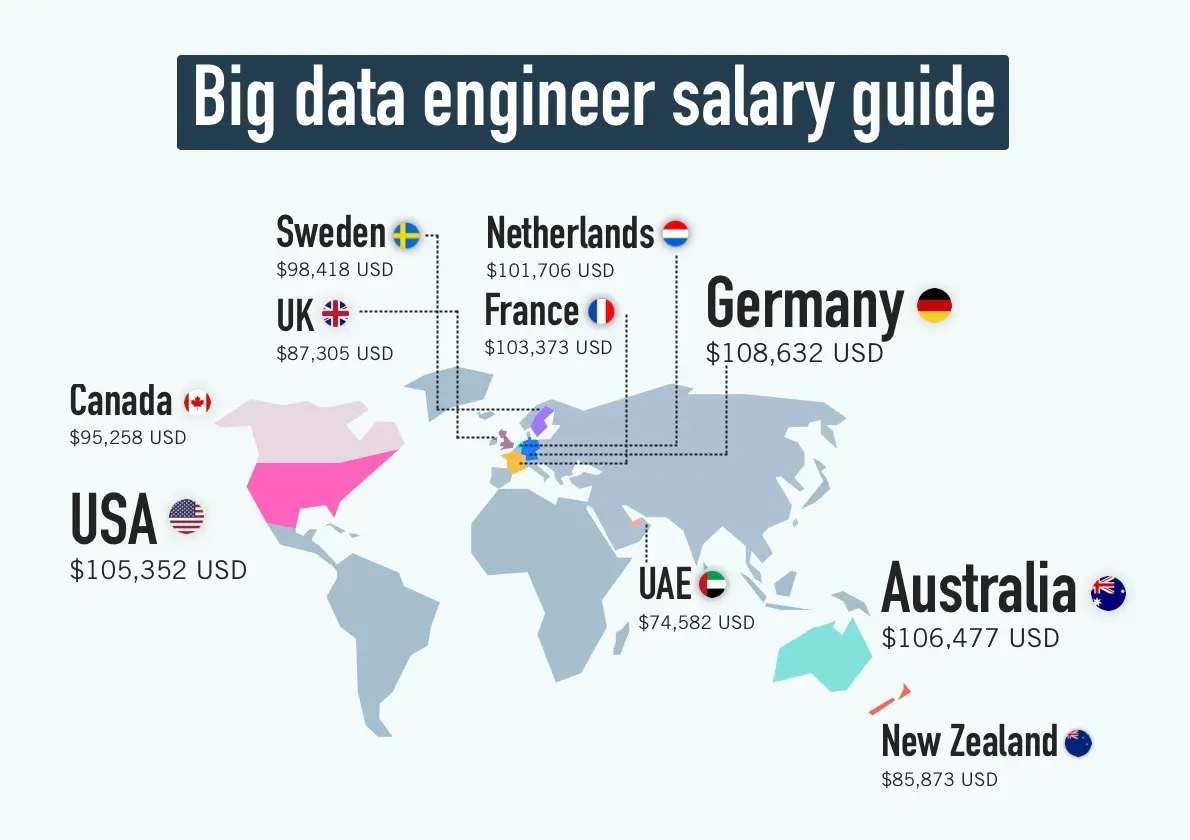How much can a big data engineer earn? What impact does experience, location, and job title have on their salary? Find out in this post.
In today’s world, we produce, collect, and store more data than at any other point in human history. The volume grows day by day. As a result, data experts are in hot demand right now, and in particular, big data engineers. This is because of the cohesive role they play in all other data-related tasks.
So what does a big data engineer actually do? A data engineer’s job is to create, test, and maintain an organization’s data infrastructure. By holding everything together, data engineers are the hub at the center of the data science wheel.
Interested in seeing if a data career could be for you? Try this free data short course on for size.
With such a crucial role, it follows that big data engineers can earn a comfortable living. In this post, we look at how much big data engineers can earn based on their experience, location, industry, and company. We’ll cover:
- What does a big data engineer do?
- Are big data engineers in high demand?
- How much do big data engineers make?
- Big data engineer salary based on experience
- Big data engineer salary by geographic location
- Big data engineer salary by job title
- Big data engineer salary by company
- How to become a big data engineer
Just to note before we start that we’ll use U.S. dollars throughout this post (for consistency). The main sites we’ve sourced our data from are Glassdoor, Payscale, and Salary Expert. With all that covered, let’s find out how much you can earn as a big data engineer.
1. What does a big data engineer do?
Big data engineers develop, manage, and maintain an organization’s data infrastructure.
They do this by collecting and transforming swathes of big data and storing it in databases in a format that make it easier for stakeholders to use. These stakeholders may include senior leadership, data analysts, and data scientists.
This involves building data warehouses (for storage) and data pipelines (for funneling data into these structures). It also incorporates varying levels of data analytics. The purpose of all this is to get big data into a user-friendly format so that it can be applied to everything from sentiment analysis to machine learning, and a plethora of other data activities.
2. Are big data engineers in high demand?
Frankly, IT specialists of any variety are always highly sought-after, so, yes! Big data engineers are certainly in high demand for many large and growing organizations.
The Dice 2020 Tech Job Report showed that data engineers were the fastest-growing tech job, showing 50% growth year on year! This same report also gave insights on the top data engineering skills required by those looking to get into this exciting field: SQL, Python, big data, Hadoop, and ETL. You can learn more about those languages and tools in this article on big data tools.
3. How much do big data engineers make?
While it can be tricky to get an exact figure on this, we’ve collected data from several job sites and online salary trackers to obtain as broad an estimate as possible. First though, a couple of caveats:
- We’ve focused on the job title “data engineer” only
- We’ve specifically looked for roles in the United States
According to the job site Glassdoor, data engineering has been climbing the ranks of the United States’ most sought-after roles. In 2018, data engineering was at a lowly number 33 on Glassdoor’s top 50 list. By 2020, it had leaped up to number 6. The mean salary reflects this changing trend, growing from $100,000 in 2018 to $124,493 in late 2023.
Meanwhile, the job site Indeed has produced a higher estimate, suggesting that the average salary for data engineers in the U.S. is $126,126. Salary.com puts the average salary at $116,655; Salary Expert at $112,429; and Payscale offers a slightly more conservative estimate of $96,253.
While there’s some variation here, that’s to be expected. The main thing is that none of these figures is anything to sniff at. Taking an average of them all, we can deduce that the mean salary for data engineers in the U.S. is somewhere around $106K. There’s potential to earn much more, too, depending on other factors. Let’s look at some of these now.
4. Big data engineer salary based on experience
The most important factor impacting your earning potential is how experienced you are. For example, if you have a long career in software development and are stepping into big data, you’ll likely start with a pretty good salary. Meanwhile, if you’re a data intern, you’ll have to work your way up the ladder first!
What will help you are demonstrable skills, knowledge of various databases, and suites of architecture tools (such as the Apache stack). General data theory is key, too.
Big data engineer salary: Entry-level
Entry-level roles might not require years of hands-on experience, but you will need at least some basic data analytics theory. You’ll also require practical experience with tools like SQL and programming languages like Python or Java.
According to Payscale (who offer low estimates, but we’d rather set realistic expectations than unachievable ones) entry-level data engineers can earn from around $59K to a mean of $78K. Not too shabby, even for a beginner.
However, to earn more, you’ll have to invest some time developing the necessary skillset. Aim to master tools like Python, ETL (extract, transform, load) procedures, SQL, and big data architectures like Apache Spark. You’ll benefit from some fundamental knowledge and practical experience in data analytics, too.
Big data engineer salary: Mid-career
According to Payscale, a mid-career data engineer in the U.S. can earn from $82K to about $146K. To boost your earning potential, you should build on the skills we outlined for entry-level data engineers. Knowledge of additional databases and warehousing products (like PostgreSQL and Amazon Redshift) can help. You might also want to start developing your know-how of other architectures in the Apache ecosystem, for instance Hive and Kafka.
Big data engineer salary: Senior
Last but not least, according to Payscale, an experienced data engineer in the U.S. can earn from around $88K to an average salary of about $160K. What’s more, with additional experience (and potential bonuses) this can grow to about $156K per year.
Expert knowledge of Java, Scala, and a much broader understanding of big data analytics will be crucial for maximizing your earning potential. At this point, your skillset will likely be skirting the boundaries of more complex data science roles. You may also benefit from a Ph.D. or master’s in an area relevant to your field of work. There are plenty of possibilities! You can learn more about the difference between a data scientist and a data engineer here.
5. Big data engineer salary by geographic location

The numbers we’ve shown so far are U.S.-focused. They offer a good indicator of the general spread of what you can hope to earn, regardless of your location. However, the actual amount will vary depending on where you’re based and what currency you’re using.
In this section, we rank ten countries around the world based on their average data engineering salaries. For this, we’ve drawn on global data from the comparison website Salary Expert. We’ve reincluded the U.S. average salary (just for context) and have converted all the figures into US dollars to make the comparison easier.
Here’s our handpicked top ten:
- United States: $112,429
- Germany: $106,170 (or €98,429)
- Australia: $98,380 (or $149,575 AUD)
- Netherlands: $90,088 (or €84,539)
- France: $89,479 (or €84,020)
- Canada: $88,814 (or $120,182 CAD)
- Sweden: $82,726 (or 843,626 kr)
- United Kingdom: $85,138 (or £68,037)
- New Zealand: $81,356 (or $125,381 NZD)
- United Arab Emirates: $76,918 (or 282,485 د.إ.)
The United States, Germany and Australia offer the most competitive data engineering salaries—on our report for 2021, the U.S. came in third, but has risen up the ranks over the past year to come out on top for 2024! In general, big data engineering salaries in Europe are some of the best in the world, although there’s some variation between countries.
If you’re considering relocating, bear in mind that quality of life is an important factor to consider. In real terms, a low salary in one country might go much further towards your cost of living than a high salary in another, more expensive country. Something to keep in mind.
So, what other factors impact how much you can earn? Let’s find out.
6. Big data engineer salary by job title
Not all big data engineers have a generic job title. More often than not, data engineers are defined by the type of architecture that they use, the suite of tools they require, or by some other specialist aspect of the job.
Since software development is a key part of data engineering, you’ll often find that data engineering is a required skill for many developer roles, too. This all impacts salary.
In this section, we list a few different data engineering job titles, the average US salary to expect for each, and the key skills you’ll need to develop for each one:
- Big data architect. The mean salary for a big data architect is $131K. Key skills include database architecture and warehousing, BI tools, data modeling, and SQL.
- Technical architect. The mean salary for a technical architect is $125K. Key skills include network architecture and design, Java/J2EE, Oracle, and cloud computing.
- Solutions architect. The mean salary for solutions architects is $126K. Skills for this role include things like SAP Business Warehouse, database administration, Apache Kafka, ServiceNow, as well as a broad knowledge of enterprise software solutions.
- Machine learning engineer. The mean salary for machine learning engineers is $116K. Key skills include machine learning, deep learning, natural language processing (NLP), Python, and computer vision. Dig more into what you could make in our machine learning engineer salary guide.
- Software engineer. A software engineer’s mean salary is $9K. The best software engineers will be skilled using a selection of programming languages (Python, JavaScript, C#, etc), and distributed systems like Apache Zookeeper.
- Data warehouse developer. The mean salary for a data warehouse developer is $87K. Relevant skills include data architecture and modeling, SQL, Oracle, ETL, and SQLServer.
- Business intelligence (BI) developer. The mean salary for a BI developer is $86K. Key skills include knowledge of any business intelligence tools, extract, transform, load (ETL) processes, as well as SQL, SQLServer, and data viz tools like Tableau.
Next up, let’s give you a little taster of what you can aim for.
7. Big data engineer salary by company
While it’s not true for all, the vast majority of big data engineers work in tech-driven companies. The size and success of those companies play a key part in how much you earn.
This section offers some inspiration for those with an ambitious streak, providing average salaries for data engineers working at the Big Five tech providers. Data engineering underpins almost all of the work that they do, and they’re always looking for fresh talent.
All the figures here are taken from Glassdoor. These are based on salaries from real job descriptions, meaning the estimates have a high degree of accuracy. In descending order:
- Average big data engineer salary at Meta: $229K
- Average big data engineer salary at Google: $205K
- Average big data engineer salary at Microsoft: $183K
- Average big data engineer salary at Amazon: $167K
- Average big data engineer salary at Apple: $170K
While you won’t earn as much with smaller players, you can still expect above-average salaries at other tech companies like Netflix or PayPal. If you fancy the idea of working for a large provider like one of these, don’t rule anything out—aim high!
8. How to become a big data engineer
In this post, we collated the most up-to-date average salary information for big data engineers in the U.S. and around the world. We’ve learned that, while there’s a huge range of potential salaries, these vary based on things like experience, location, job title, and company.
We also found that entry-level salaries for data engineers start in the region of about $58K. With more experience and precision skills in areas like data warehousing and enterprise software, you could potentially earn up to around $156K, and possibly even more.
The journey isn’t prescribed, though. If you want to earn more money, or simply to take on the challenge of other data-related tasks, nothing is stopping you. Over time, many data engineers transition into increasingly complex data science roles. As you’ll soon discover, data engineering offers plenty of potential—not just to earn, but to learn.
To find out more about data analytics and data engineering, why not try out this free, 5-day, introductory data analytics short course?
We can also recommend the following articles:

